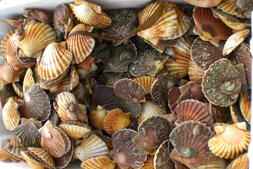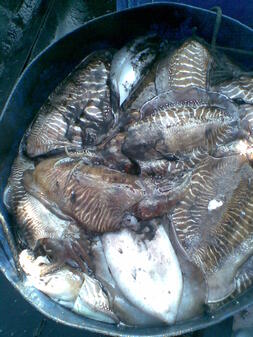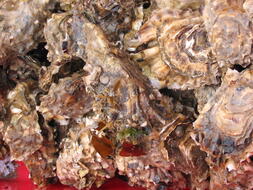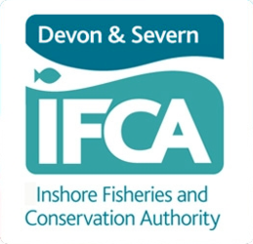Molluscan Research in D&S IFCA’s District
- Home
- Environment & Research
- Research
- Molluscan Research in D&S IFCA’s District
Page review/updated 04/12/2024
(Content of overview page last updated: 21st November 2022)
Molluscs or Mollusca include cephalopods such as squid, cuttlefish, and octopuses; gastropods such as sea snails, whelks and winkles; bivalveswhich include many commercially harvested species such as mussels, oysters, cockles, clams, and scallops; scaphopods – the tusk shells; and polyplacophorans – the chitons.

Within the D&S IFCA’s District molluscan fisheries include very important wild and cultivated species. The most important wild capture species are scallops, whelks, and cuttlefish. In 2018 landings of scallops into Devon’s ports for all UK vessels (both under 10m and over10m in length) equated to 4,527 tonnes worth £9.56 million. These figures will include scallops caught outside the IFCA’s District by the larger vessels over the 15.24m limit allowed within the District. For the under 10m vessels the 2018 landings were 615 tonnes worth £751,000. Whelks are another important molluscan species largely fished within the D&S IFCA’s District and landed into Devon’s ports. In 2018, 1,155 tonnes were landed, worth £1.49 million. Cuttlefish are mainly targeted outside the 6nm boundary of the District extending out to the Mid English Channel. However, there is a trawl fishery within the District and an inshore pot fishery between March and June each year. The landings into Devon’s ports, in particular Brixham and Plymouth, are significant for the local economy. In 2018 landings for all sized vessels into Devon’s ports were 2,975 tonnes of cuttlefish worth £11.32million. The under 10m vessels landed 126.7 tonnes worth £533,040.

Molluscs are also important cultivated and harvested species within the D&S IFCA’s District. The Mariculture section of the website details the important species and shellfish businesses that exist within the inshore coastal areas and estuaries of the District. Mussels are of particular importance, being harvested from intertidal areas and from rope grown mussel farms. Oyster cultivation too is economically significant, and is active in several of the estuaries in the District including the Teign, Yealm, Dart and Avon Estuaries, as well at Porlock Weir in Somerset. Other species harvested commercially are surf clams and winkles and recreational gathering of molluscs include the following species: cockles; clams; winkles; and razor clams.

Research undertaken in the D&S IFCA’s District includes stock assessments of intertidal mussel and cockle beds; developing scallop stock assessment methodologies with Cefas; Salcombe scallop stock assessments; size of sexual maturity and reproductive seasonality of whelks; mapping wild shellfish beds; cuttlefish fishing effort studies, trialling cuttlefish egg laying media and fishery impacts. The research work undertaken by D&S IFCA is detailed below for the different molluscan species.
